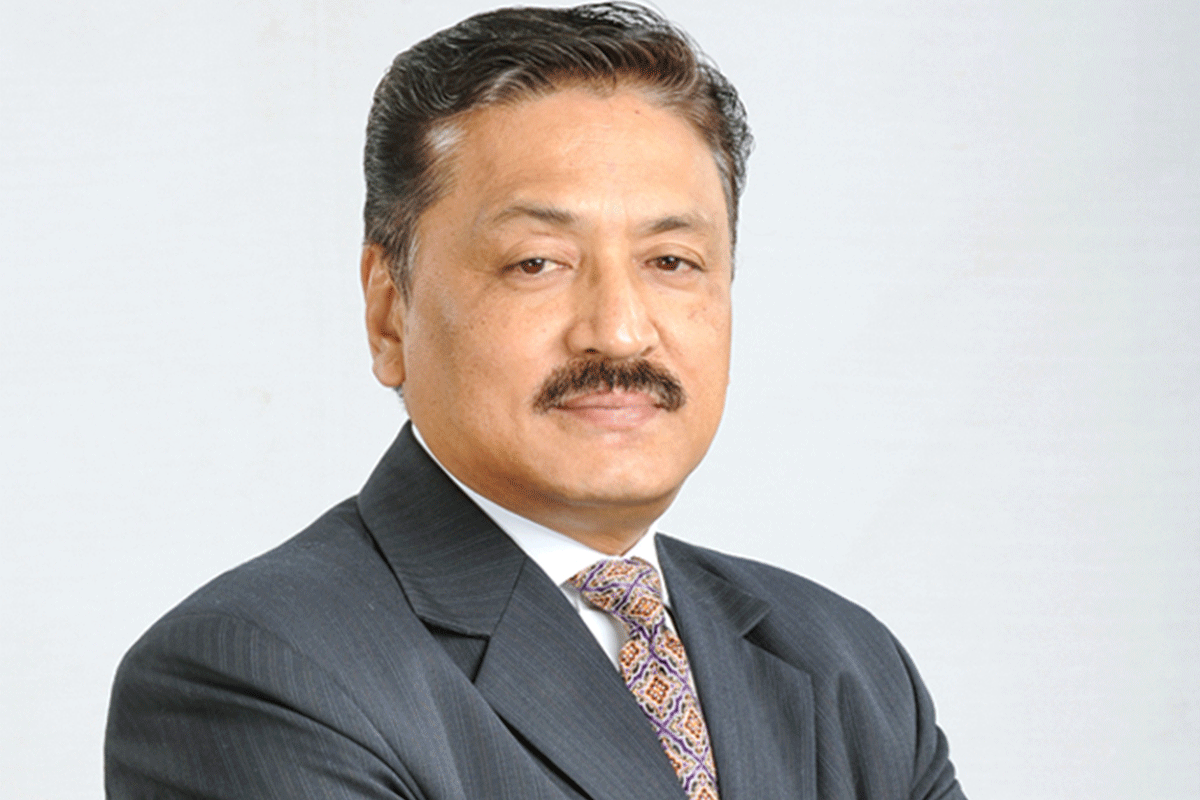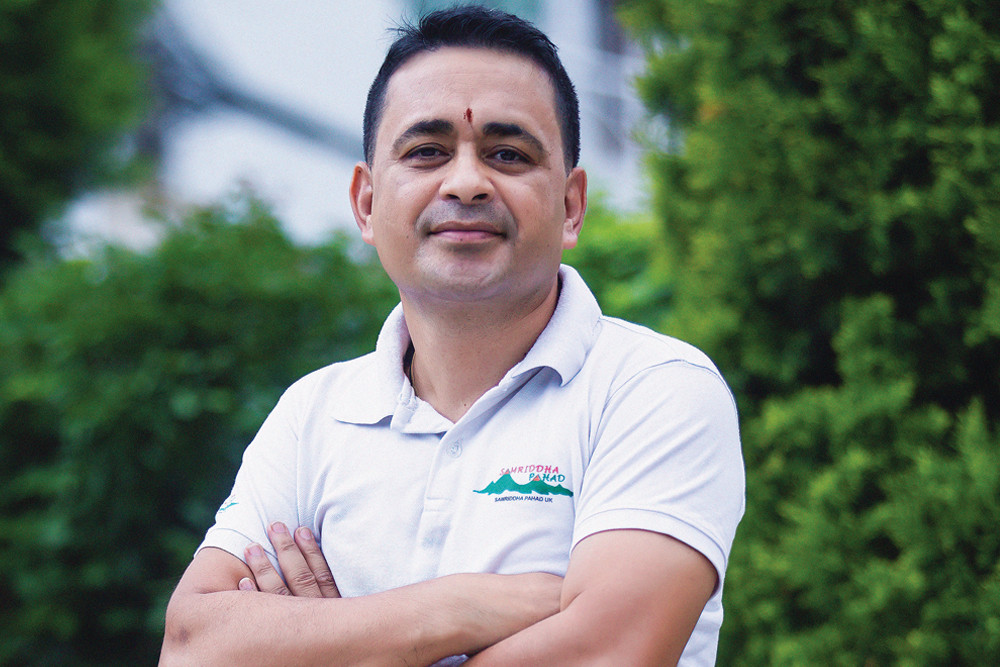
A prominent business personality, former banker and entrepreneur, Kishore Kumar Maharjan played the role of the founder CEO of Sunrise Bank and Civil Bank. Maharjan now chairs Star Hospital. He is also the Chairman at Modern Technical College, an allied health science college running BMLT, BPH and BPharma programs under Pokhara University, and the Chairman of Star Academy, nursing college running PCL Nursing and Health Assistant programs under CTEVT as well as Chairman of Innovative College of Allied Health Sciences which runs a Bachelors in Nursing Program. In addition, he is the Chairman of KFA Agro Farm run in Siraha and promoted by the KFA Group.
A amn of diversified talents and interests, Maharjan is the President at the Nepal Squash Rackets Association, Chairman of Lalitpur Patriots International, a company which owns Lalitpur Patriots, a professional cricket team under the franchise of Everest Premier League, and the Chairman of Welding Ideas International, a consulting firm.
He was formerly associated with Chhimek Bikash Bank, is the founding Chairman of the Board of Directors of Credit Information Center Limited promoted by Nepal Rastra Bank and financial institutions for collecting and disseminating credit information of business enterprises, and is the President of the Ex-AVMs Alumni Association.
In an email interview with Business 360, Kishore Kumar Maharjan shares his thoughts on leadership especially in the time of the present pandemic.

What is your definition of a leader?
I would define a leader as a person who has the ability to lead a group, an organisation, a community or a nation, rally them towards achieving a well-defined mission which is a sum total of visions and aspirations of all the participating members/people by engaging them, motivating them, pushing them with integrity, honesty, empathy and humility.Is leadership “in-born” or “acquired”?
Leadership just doesn’t happen with the snap of a finger. Leadership gets absorbed into your system from the environment you live in. This happens from the very early years of your life. You are never born a leader but then you can’t acquire leadership qualities through classroom lectures alone. The family characteristics, the upbringing, the companions you hang around with, the environment you operate in… all help to bring out the qualities that are hidden within you. For this, one must have a learning attitude and teaching attitude as well, interest in observing what’s going on around you and beyond, the ability to analyse and then adapting to better versions of your observation. Over time, maturity develops and with maturity, the ability to lead automatically surfaces during times of need almost in the same manner as the body responding automatically with reflexive actions.Who comes to your mind as an ‘ideal leader’?
‘Ideal Leader’ is a relative term. The phrase can be coined with many leaders in this world who have excelled in their own sectors with their own belief and visions. There are leaders leading nations for good or bad (like Winston Churchill, Mahatma Gandhi or Adolf Hitler), leaders leading communities (like Sai Baba or Rajneesh), leaders leading corporate institutions (like Bill Gates, Steve Job, Ratan Tata). For me, an ideal leader should also be a person whose actions have brought positive influences in your personal life and the larger society where you live. For me, Late B.P. Koirala is my ideal leader as his vision of a Socialistic Democratic Nepal has shaped the political climate in the country - giving birth to the democratic system through the Nepali Congress Party and the eventual advent of the leftist political parties (Marxist-Leninists and Maoists) as well. He is one leader who is respected equally by opposition parties as well.An incident at any of your earlier organisations or at the Star Hospital which presented a great deal of leadership challenges in front of you?
During the three decades plus banking career, the last ten years staying at the helm as CEO of two commercial banks I founded, I encountered many challenges which I had to navigate for safe landing. Now at the Star Hospital, a totally new sector for me, my leadership skills are being really tested on many fronts, especially during these Covid times. My biggest challenge, multiplied manifold due to the ongoing Covid borne pandemic, has now come in form of mobilising financial resources to ensure prompt payment of staff salary, debt servicing, vendor payments, tax settlements, continuous procurement of instruments for service expansion, etc. With my role shifting from loan giver to loan taker, the biggest challenge erupted in April 2020 when we didn’t even have a quarter of the funds to pay the salary of our staff, let alone bank obligations. The following three month period, motivating the staff to continue working (including the medical doctors/consultants) at half salary, setting up RT- PCR testing lab whose operation approval was not given by the government until mid-July, negotiating for additional loans from the consortium of banks to pay staff salary and setting up of the PCR molecular lab and holding together my wits to maintain my calm, was probably one of my biggest challenges ever. And today, with the second wave onslaught of the new variant Covid, I am facing biggest challenge in oxygen management as demand for oxygen has gone up more than 200% compare to the first wave last April. Now 80% of the hospitalised patients need oxygen with 50% of them requiring 15 to 60 liters per minute. During the first wave, only about 50% required oxygen of which less than 25% of them required 15-60 liters per minute.The challenge now is to save lives.How important is it to have a good team?
A good team is vital for executing a good leader’s vision and the organisation’s mission. Even the policy/strategy preparation can be complete only if the process is well participated in by the team members. Operating an organization requires multiple disciplinary wings. As the growth of the organisation takes place vertically and horizontally, controls will be possible only with good competent heads of such wings. At Star Hospital, the growth is vertical (with new service outlets) as well as horizontal (with three academic institutions expanding their own programs). Successful operations of all these verticals is possible only with the coordinated effort of the team members.
When should leaders hand-over the leadership position?
Leaders should be honest and smart enough to realise that they must now handover the top position. Leadership position can be handed over to the successor under numerous circumstances such as: • You have led the organisation towards achieving its goals, achieved it, and you have nothing much to do within your active remaining life. • You want to sit back, rejoice and relax with the results of your achievement. • You have groomed your successor with adequate qualities and now you want to retire from direct participation in execution. • You feel that you have reached the optimum level of your ability to perform in terms of your mental and physical health for executing your own plans, projects and vision. • You are feeling lesser motivated to continue with the same drive due to monotonous factor, health reason or age factor. • You are humble and honest to realise that your groomed successor now has excelled and can perform better if given the position at the helm. • You feel that you are beginning to make errors in your judgements due to your age factor (and complexity of the modern day challenges too) and then important people under you begin to frown on the rationality of your judgements. Any book on the leadership that you want to recommend There are many books written on leadership which can influence our thinking processes and the working style. Nevertheless, reading one book alone is not enough. I would recommend a few of them: 1. How To Win Friends & Influence People by Dale Carnegie: Possibly one of the oldest books (we grew up reading this book in school days) talking about leadership, published in 1936, Carnegie’s advice about persuasion, career advancement, communication and influence are very relevant even today. 2. The Art of War by Sun Tzu:The book is based on Chinese military treatise dating back more than 2000 years; can influence military way of thinking, formulating business tactics, legal strategy and more. 3. On Becoming a Leader by Warren Bennis: The book fully supports my own belief – that leaders are not born, they are made. 4. Primal Leadership: Unleasing The Power Of Emotional Intelligence by Daniel Goleman, Richard Boyatzis and Anne Mckee: I have got well influenced by this book as it delves into emotional intelligence; says great leaders ignite your passion and inspire the best in us; great leadership works through emotions and believes in always being there when required.What major challenges do you face being at the helm of a private hospital especially in the time of Covid19?
There are lots of challenges. Here you are dealing with many parties – various factions of the medical fraternity (doctors, nurses, paramedics, etc.), the administrative staff, the patients and the patient parties, various government agencies, vendors, pharmaceutical companies and banks. Dealing with Senior Doctors/Consultant as a non-medic professional is indeed very challenging. During these Covid times, procuring adequate high value instruments, managing doctors and finding right number of other health workers and keeping them motivated are all very challenging. In the present pandemic situation, managing the surging covid cases, counseling patient parties and satisfying the health authorities is another aspect of challenge. The biggest challenge that the entire hospital sector is undergoing right now is securing adequate oxygen supply. The supply situation barely meets 50% of the total requirement and many patients are dying due to the failure of many hospitals to procure oxygen supply. And then of course, financial management with the government capping the hospital charges, the increasing cost of operation (massive additional manpower and hazard allowances), the cost of the additional equipment/instruments and logistics supports, etc., fully tests the capability of the leadership.What do you consider your most significant accomplishment as a leader?
There have been many accomplishments in the banking sector as possibly the only CEO to have founded two commercial banks from zero. In my present organisation, turning around the perpetual loss making company to profit making company, even during these critical times we are going through now, with vertical and horizontal growth activities can certainly be termed achievement.Does the gender of a leader affect the leadership role?
I always believe that the gender should not affect the role of leadership.Women are as equally capable as men in all aspects – be it in high tech jobs, administrative jobs, medical jobs, education sector, politics or business. However, women need to be given the same amount of freedom as men enjoy. Not all men in the house do household chores – cleaning, washing, cooking, tending to children and looking after the physical needs of the elderly at home. Such activities affect the professional career of women and their opportunity to develop themselves to the top of the organisation gets adversely affected. As modern day men are beginning to share the household chores these days, we can witness lots of women in many sectors rising to the top as effective leaders.Tomorrow, I definitely would like to see women occupying 50% of the top positions since women are very efficient, systematic, have good integrity and more ethical too.
Published Date: May 29, 2021, 12:00 am
Post Comment
E-Magazine
RELATED Leadership


.jpg)


.jpg)